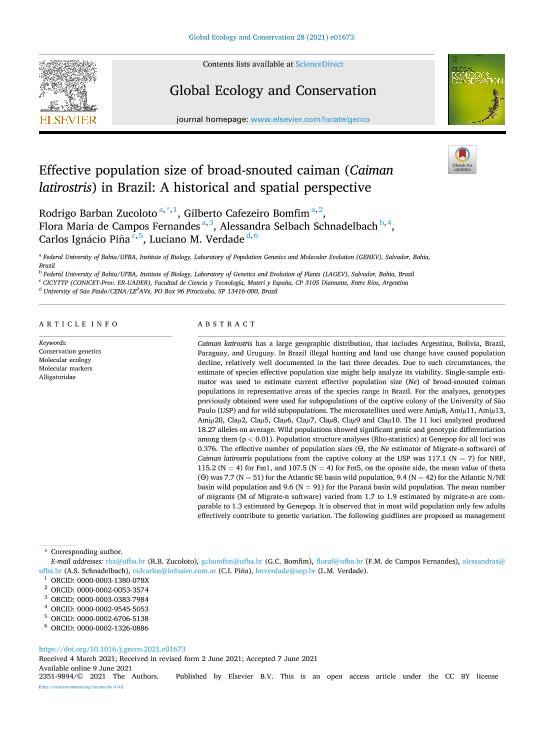Mostrar el registro sencillo del ítem
dc.contributor.author
Zucoloto, Rodrigo Barban
dc.contributor.author
Cafezeiro Bomfim, Gilberto
dc.contributor.author
de Campos Fernandes, Flora Maria
dc.contributor.author
Selbach Schnadelbach, Alessandra
dc.contributor.author
Piña, Carlos Ignacio

dc.contributor.author
Verdade, Luciano Martins

dc.date.available
2022-08-08T16:55:10Z
dc.date.issued
2021-08
dc.identifier.citation
Zucoloto, Rodrigo Barban; Cafezeiro Bomfim, Gilberto; de Campos Fernandes, Flora Maria; Selbach Schnadelbach, Alessandra; Piña, Carlos Ignacio; et al.; Effective population size of broad-snouted caiman (Caiman latirostris) in Brazil: A historical and spatial perspective; Elsevier; Global Ecology and Conservation; 28; 8-2021; 1-11
dc.identifier.issn
2351-9894
dc.identifier.uri
http://hdl.handle.net/11336/164589
dc.description.abstract
Caiman latirostris has a large geographic distribution, that includes Argentina, Bolivia, Brazil, Paraguay, and Uruguay. In Brazil illegal hunting and land use change have caused population decline, relatively well documented in the last three decades. Due to such circumstances, the estimate of species effective population size might help analyze its viability. Single-sample estimator was used to estimate current effective population size (Ne) of broad-snouted caiman populations in representative areas of the species range in Brazil. For the analyzes, genotypes previously obtained were used for subpopulations of the captive colony of the University of São Paulo (USP) and for wild subpopulations. The microsatellites used were Amiμ8, Amiμ11, Amiμ13, Amiμ20, Claμ2, Claμ5, Claμ6, Claμ7, Claμ8, Claμ9 and Claμ10. The 11 loci analyzed produced 18.27 alleles on average. Wild populations showed significant genic and genotypic differentiation among them (p < 0.01). Population structure analyses (Rho-statistics) at Genepop for all loci was 0.376. The effective number of population sizes (Ɵ, the Ne estimator of Migrate-n software) of Caiman latirostris populations from the captive colony at the USP was 117.1 (N = 7) for NRF, 115.2 (N = 4) for Fm1, and 107.5 (N = 4) for Fm5, on the oposite side, the mean value of theta (Ɵ) was 7.7 (N = 51) for the Atlantic SE basin wild population, 9.4 (N = 42) for the Atlantic N/NE basin wild population and 9.6 (N = 91) for the Paraná basin wild population. The mean number of migrants (M of Migrate-n software) varied from 1.7 to 1.9 estimated by migrate-n are comparable to 1.3 estimated by Genepop. It is observed that in most wild population only few adults effectively contribute to genetic variation. The following guidlines are proposed as management actions: (1) an update of population sampling; (2) redefinition, delimitation and conservation of natural habitats; and (3) new conservation genetic studies with special attention to genetic diversity recovery.
dc.format
application/pdf
dc.language.iso
eng
dc.publisher
Elsevier

dc.rights
info:eu-repo/semantics/openAccess
dc.rights.uri
https://creativecommons.org/licenses/by/2.5/ar/
dc.subject
ALLIGATORIDAE
dc.subject
CONSERVATION GENETICS
dc.subject
MOLECULAR ECOLOGY
dc.subject
MOLECULAR MARKERS
dc.subject.classification
Conservación de la Biodiversidad

dc.subject.classification
Ciencias Biológicas

dc.subject.classification
CIENCIAS NATURALES Y EXACTAS

dc.title
Effective population size of broad-snouted caiman (Caiman latirostris) in Brazil: A historical and spatial perspective
dc.type
info:eu-repo/semantics/article
dc.type
info:ar-repo/semantics/artículo
dc.type
info:eu-repo/semantics/publishedVersion
dc.date.updated
2022-03-08T21:45:19Z
dc.journal.volume
28
dc.journal.pagination
1-11
dc.journal.pais
Países Bajos

dc.description.fil
Fil: Zucoloto, Rodrigo Barban. Universidade Federal da Bahia; Brasil
dc.description.fil
Fil: Cafezeiro Bomfim, Gilberto. Universidade Federal da Bahia; Brasil
dc.description.fil
Fil: de Campos Fernandes, Flora Maria. Universidade Federal da Bahia; Brasil
dc.description.fil
Fil: Selbach Schnadelbach, Alessandra. Universidade Federal da Bahia; Brasil
dc.description.fil
Fil: Piña, Carlos Ignacio. Provincia de Entre Ríos. Centro de Investigaciones Científicas y Transferencia de Tecnología a la Producción. Universidad Autónoma de Entre Ríos. Centro de Investigaciones Científicas y Transferencia de Tecnología a la Producción. Consejo Nacional de Investigaciones Científicas y Técnicas. Centro Científico Tecnológico Conicet - Santa Fe. Centro de Investigaciones Científicas y Transferencia de Tecnología a la Producción; Argentina
dc.description.fil
Fil: Verdade, Luciano Martins. Universidade de Sao Paulo; Brasil
dc.journal.title
Global Ecology and Conservation
dc.relation.alternativeid
info:eu-repo/semantics/altIdentifier/url/https://linkinghub.elsevier.com/retrieve/pii/S2351989421002237
dc.relation.alternativeid
info:eu-repo/semantics/altIdentifier/doi/http://dx.doi.org/10.1016/j.gecco.2021.e01673
Archivos asociados
